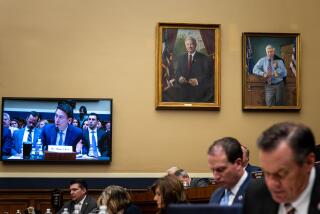Worrying About the State of the Presidency
- Share via
Sometimes outsiders, especially when they have so much at stake in what we do, can see us more clearly than we can see ourselves. Asians who are the most downcast about America’s preoccupation with the Clinton sex scandal tend to regard it as a dangerous and irresponsible diversion from more consequential issues, fueled by a relentless and poisonous process that is chipping away at the powers of the presidency itself. At a time when this institution’s full and unfettered clout is needed as never before, many feel that the office itself is under siege. Many in Asia worry about a permanent impairment of the presidency and of the U.S. international role should the incumbent president be brought down over issues that merit considerably less gravity.
To be sure, Asians are humiliated by their economic crisis, well aware that their up-and-coming image has declined along with their economies. But America’s image in Asia is deteriorating, too, with the sex scandal’s every lingering day.
Ever since the Lewinsky scandal surfaced in January, the overall reaction from Asia in its public press but even in the ordinarily careful, not-for-attribution words of its diplomats, has been both incredulous and fearful. Typical perhaps was the Straits Times, the leading newspaper of culturally conservative Singapore: “A man sleeps with a woman not his wife. Generally speaking, not a good idea, but unfortunately, not uncommon. For that reason, one hardly expects it to become the occasion of a constitutional crisis.” From Malaysia, the New Straits Times opined: “As far as the U.S. media [are] concerned, it is the story of the decade. It is bigger than all others--Middle Eastern problems, Asia’s financial crisis.”
The Sydney Morning Herald, likening Clinton’s current travails to Nixon’s debilitating preoccupation with Watergate two dozen years ago, wrote: “The U.S. needs the president’s full attention. In important ways, so does the rest of the world.” An Australian diplomat echoed the sentiments of many officials I’ve talked to these past months when he expressed virtual contempt for the destructive tenacity and dysfunctional myopia of the U.S. legal and media systems. “You’re wasting the trust dividend that Clinton has built up in Asia, which in general recognizes that Clinton has worked hard to raise the quality of his communication with the region, especially with China. This effort has been so important,” he said. “And now America wants to erode that trust by chipping away at and humbling the office of the presidency. I find this tragic and unbelievable.” A prominent, pro-U.S. Japanese business executive in Tokyo warned: “Americans have to accept that the U.S. presidency doesn’t belong just to America.”
Through decisive presidential action, America, the last superpower, can offer a lifting hand in crisis or an exit light in darkness. One concern, of course, is that a president’s conduct with someone half his age betrays a fatal character flaw that erodes the moral force of the presidency. But Asia, reeling from a downward spiral that needs the upward push of outside intervention, is unnerved by a relentless scandal that threatens to reduce the institution of the presidency to the sum of its occupant’s private parts.
Asians are not naive about the president’s lack of mature judgment, which is at least partly responsible for the potential meltdown of his presidency. “He shouldn’t have done it, if he did,” a top Taiwanese diplomat told me. “But America shouldn’t push the point, certainly if it expects the world to respect its judgment.” At a time when America could be demonstrating to the world just how maturely a benevolent superpower can behave, instead, in Asia’s eyes, it is showing its true age: adolescence. If this general Asian view is right--and, indeed, many U.S. polls show the American public to harbor similar instincts--a great tragedy could be in the making that’s totally unnecessary and wholly self-inflicted. But it may be too late for America to pull back from the brink.
More to Read
Get the L.A. Times Politics newsletter
Deeply reported insights into legislation, politics and policy from Sacramento, Washington and beyond. In your inbox twice per week.
You may occasionally receive promotional content from the Los Angeles Times.










